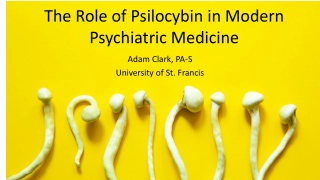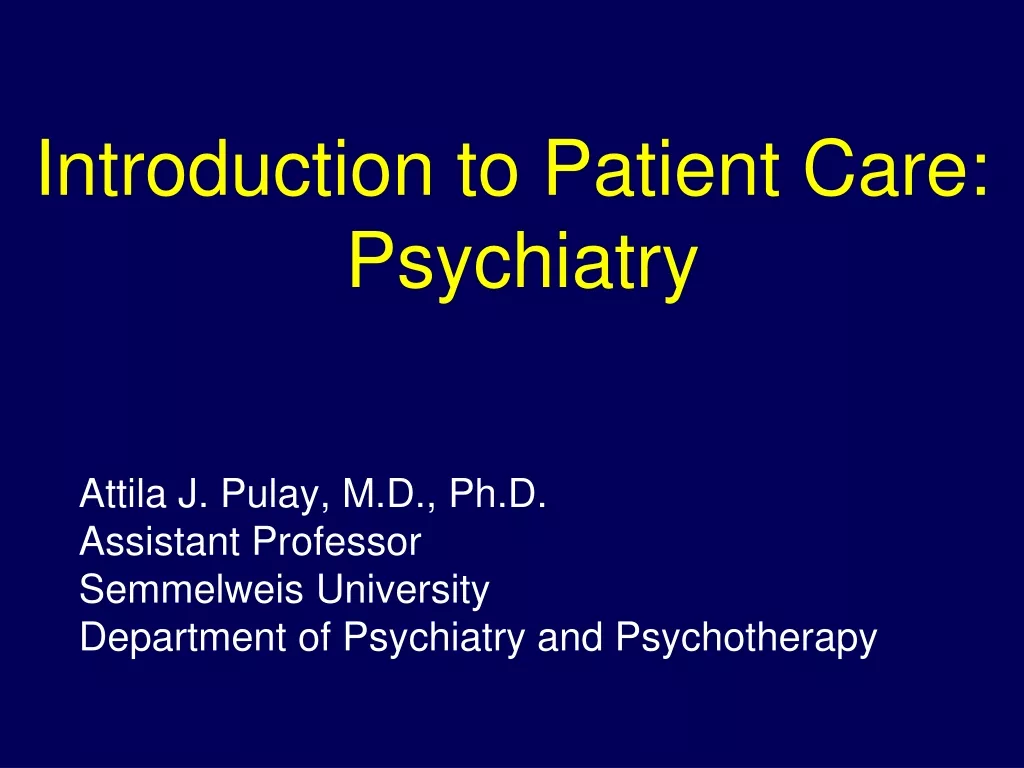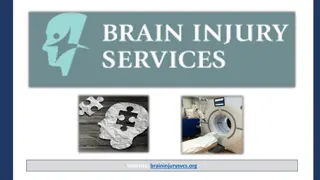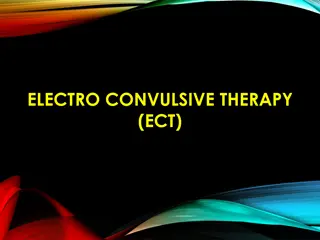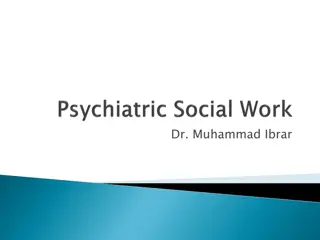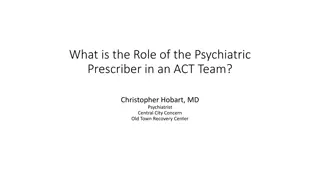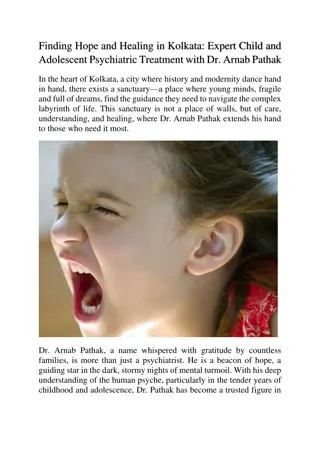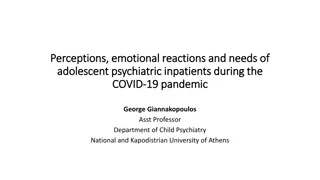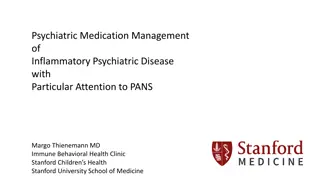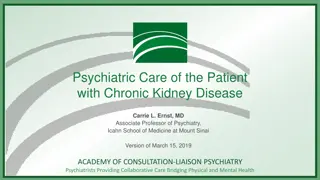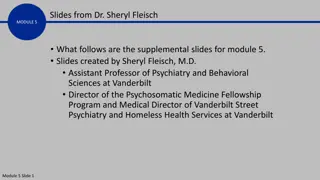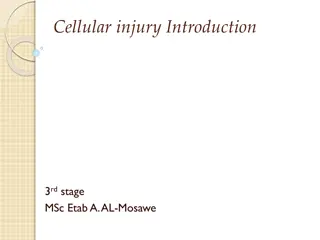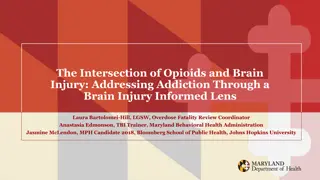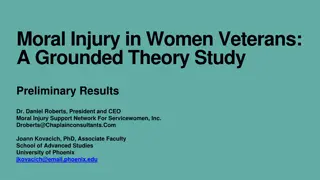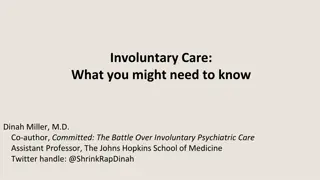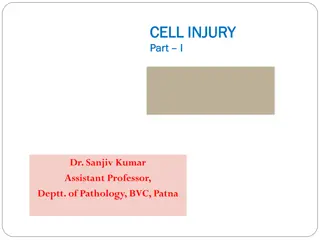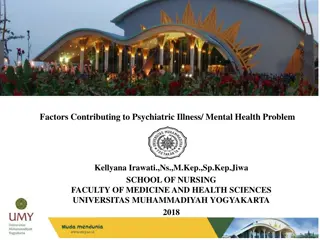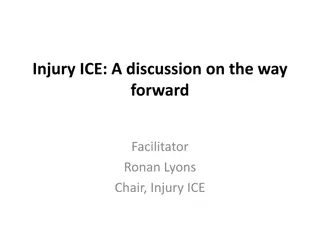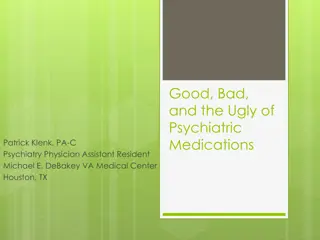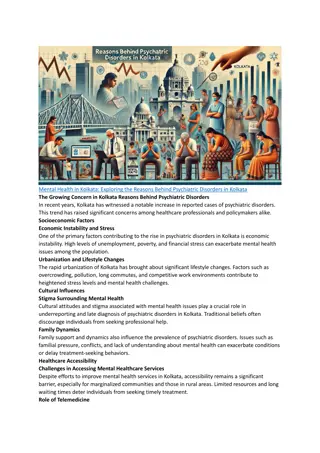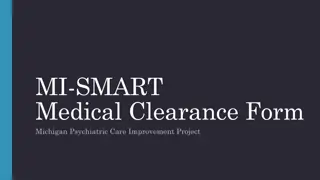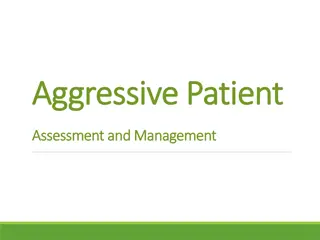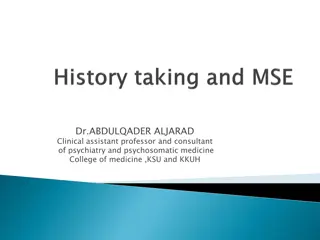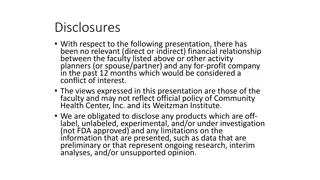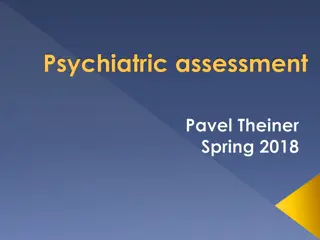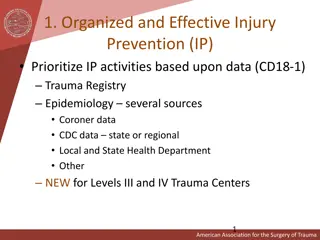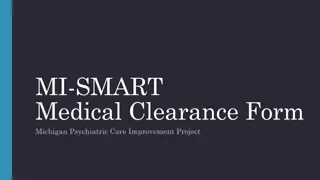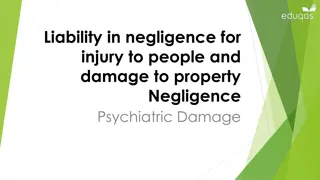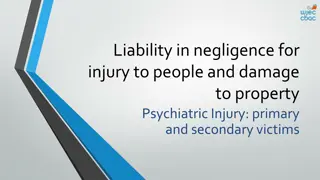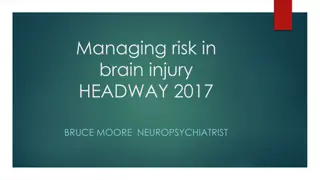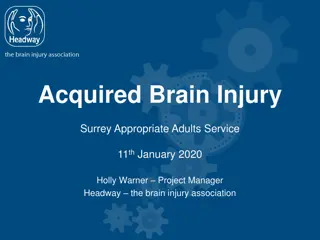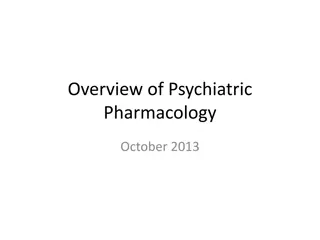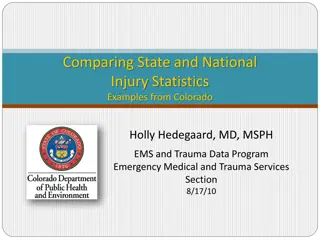The Role of Psilocybin in Modern Psychiatric Medicine
The use of psilocybin, a compound found in psychedelic mushrooms, in modern psychiatric medicine. It covers its traditional use, global distribution, early studies, and current areas of research in depression, tobacco cessation, terminal illness, and more.
1 views • 30 slides
Psychiatric Medical Management | Virtualpsychiatriccare.com
Experience compassionate and convenient psychiatric medical management with Virtualpsychiatriccare.com. Improve your mental health from the comfort of your own home.
4 views • 7 slides
Evolution of Psychiatry: A Historical Journey through Time
Psychiatry, a field blending clinical practice, biology, and social sciences, has ancient roots dating back to Graeco-Roman philosophers like Plato and Hippocrates. Significant historical milestones include the body humor hypothesis, the first mental health ward, and the emergence of psychiatric asy
2 views • 49 slides
Injury Surveillance in Scotland: Importance and Implementation Overview
Scotland's Public Health body, Public Health Scotland, leads efforts in injury surveillance to prolong healthy life, prevent disease, and promote health. Long-term investment in prevention involves various sectors. Injury surveillance is crucial as it helps manage and prevent injuries, with coded da
4 views • 24 slides
Brain Injury Services: Empowering Recovery and Support
At Brain Injury Services, we are committed to making a positive difference in the lives of individuals affected by brain injury. Through our comprehensive support services, compassionate care, and commitment to empowerment, we empower survivors to overcome obstacles, reclaim their independence, and
6 views • 7 slides
Understanding Electroconvulsive Therapy (ECT) for Psychiatric Treatment
Electroconvulsive Therapy (ECT), also known as electroshock, is a psychiatric treatment that induces seizures in anesthetized patients for therapeutic purposes. ECT has a controversial history but is well-established in the medical field. Introduced in 1938, ECT has replaced older treatments like in
1 views • 17 slides
Understanding Intimate Partner Violence and Brain Injury Connections
The link between intimate partner violence (IPV) and brain injury is significant, with studies showing a high prevalence of brain injuries among IPV survivors, particularly women. Common types of IPV causing brain injury include hits to the head, strangulation, and banging the head against objects.
1 views • 23 slides
Evolution of Psychiatric Social Work: History and Impact
Psychiatric social work is a specialized field that integrates social work principles with psychiatry to address emotional and mental health disorders. Originating in the early 1900s, it has evolved to provide crucial support to individuals struggling with mental health challenges, facilitating thei
1 views • 15 slides
Role of Psychiatric Prescriber in an ACT Team
The role of the psychiatric prescriber in an ACT team involves actively participating in team processes, attending meetings, assessing symptoms, providing medication education, conducting therapy, and home visits. They have clinical supervisory responsibilities, provide clinical supervision, monitor
0 views • 22 slides
Expert Child and Adolescent Psychiatric Treatment in Kolkata Dr Arnab@9804509480
Dr. Arnab Pathak is an expert of child and adolescent psychiatric treatment in Kolkata. For Book a consultation WhatsApp now at 91-9804509480. Child Adolescent Psychiatric Concerns. Empowering Young Minds: Expert Child and Adolescent Psychiatric Tr
1 views • 3 slides
Personal Injury and Compensation Claims Overview
Stewarts law firm focuses on serious injury claims, emphasizing a client-centered approach to personal injury litigation. This presentation aims to provide a basic understanding of compensation claims for serious injuries, the difference between clinical negligence and personal injury cases, and the
0 views • 20 slides
Perceptions and Needs of Adolescent Psychiatric Inpatients During COVID-19 Pandemic
This study explores the perceptions, emotional reactions, and needs of adolescent psychiatric inpatients amidst the COVID-19 pandemic. Through individual interviews, themes such as knowledge about the pandemic, changes in routine, feelings, positive behaviors, and social support were examined. Parti
0 views • 26 slides
Management of Inflammatory Psychiatric Disease with Focus on PANS in Pediatric Patient
Dr. Margo Thienemann discusses the psychiatric medication management of a 10-year-old boy with inflammatory psychiatric disease, particularly focusing on Pediatric Acute-onset Neuropsychiatric Syndrome (PANS). The patient presented with various symptoms including compulsions, mood swings, OCD, oppos
0 views • 45 slides
Psychiatric Care of Patients with Chronic Kidney Disease
This resource delves into the psychiatric care aspects of patients with chronic kidney disease (CKD), detailing symptoms, staging, common psychiatric disorders, pharmacokinetic changes, and renal adverse effects of psychotropic medications. It also presents facts about CKD prevalence in the US, stag
0 views • 26 slides
Understanding Psychiatric Challenges in Homeless Populations
This module sheds light on the prevalence of psychiatric disorders among homeless individuals compared to non-homeless, emphasizing issues like suicidal ideation and attempts. It also highlights the lack of psychiatry-specific training in addressing homelessness, and the potential benefits of street
0 views • 15 slides
Understanding Cellular Injury and Its Manifestations
Cellular injury can occur due to various factors like physical trauma, chemicals, radiation, and biologic agents. This process can lead to reversible or irreversible damage in cells, affecting their normal functions and possibly leading to cell death. Manifestations of cellular injury include cellul
0 views • 9 slides
The Intersection of Opioids and Brain Injury: Addressing Addiction Through a Brain Injury Informed Lens
Exploring the correlation between traumatic brain injury (TBI) and the opioid crisis, this content delves into the alarming statistics of opioid overdoses and their impact on individuals with brain injuries. Highlighting the overlap and consequences of these two major health issues, it sheds light o
0 views • 45 slides
Insights on Moral Injury Among Women Veterans: Preliminary Study Findings
Preliminary results from a grounded theory study on moral injury in U.S. women veterans reveal themes such as sexual assault, hostile work environments, and more. Participants shared their experiences, highlighting the nature of moral injury they faced, distinguishing between various forms of discri
0 views • 21 slides
Understanding the Battle Over Involuntary Psychiatric Care
Explore the complexities surrounding involuntary psychiatric care, including standards for commitment, patient rights, and differing perspectives from organizations like The Treatment Advocacy Center, NAMI, and The American Psychiatric Association.
0 views • 38 slides
Understanding Cell Injury and its Causes in Pathology
Rudolph Virchow's concept of disease starting at the cellular level is explored in this content, focusing on the impact of the external environment on cell equilibrium. The role of the plasma membrane as a barrier and the definitions of normal cell function, adaptation, reversible injury, irreversib
0 views • 16 slides
Safety Performance in Western Australia's Mineral Industry 2010-11
This presentation provides insights into safety performance in the Western Australian mineral industry for the year 2010-11. It includes definitions of key terms such as Lost Time Injury (LTI), Serious Injury, Minor Injury, Disabling Injury (DI), and various rates used to measure safety performance.
0 views • 21 slides
Factors Contributing to Psychiatric Illness and Mental Health Issues
Factors contributing to psychiatric illness and mental health problems include predisposing factors such as psychological and biological factors, as well as precipitating stressors like challenging stimuli. Mental health is defined as a state of well-being involving happiness, contentment, and effec
0 views • 15 slides
International Collaborative Effort on Injury Statistics and Methods (Injury.ICE)
Injury.ICE is a global collaboration dedicated to standardizing methods for comparing injury statistics worldwide to inform policy responses. The organization welcomes participation from academia, government statistical agencies, and NGOs. The structure includes a Steering Committee and open members
0 views • 8 slides
Understanding Psychiatric Medications: The Good, The Bad, and The Ugly
Delve into the complexities of psychiatric medications with a focus on the benefits, risks, and side effects associated with antidepressants, mood stabilizers, antipsychotics, and anxiolytics. Learn about common lab monitoring needs, drug interactions to watch for, and important considerations when
0 views • 36 slides
Exploring Reasons Behind Psychiatric Disorders in Kolkata
Mental Health in Kolkata: Exploring the Reasons Behind Psychiatric Disorders in Kolkata. The Growing Concern in Kolkata Reasons Behind Psychiatric Disorders. In recent years, Kolkata has witnessed a notable increase in reported cases of psychiatric d
0 views • 3 slides
Understanding Medical Clearance in Psychiatric Cases - Case Studies
In these case studies, patients with psychiatric conditions require inpatient psychiatric care. The Medical Stability Screen helps determine if further work-up or documentation is needed. A 23-year-old male with schizophrenia is medically stable with no additional work-up required (Green), while a 4
0 views • 10 slides
Michigan Psychiatric Care Improvement Project Overview
Michigan Psychiatric Care Improvement Project (MPCIP) is implementing crisis system improvements to enhance patient care and streamline care coordination. The project focuses on medical clearance, psychiatric bed registry, crisis hotline, and more. MDHHS and its partners aim to determine medical cau
0 views • 42 slides
Understanding Agitation and Aggression in Psychiatric Patients
Agitation is a tension state characterized by anxiety and hyperactivity seen in depression, schizophrenia, and mania, while aggression involves hostile thoughts or actions towards others, common in impulse control disorders. Psychiatric patients are usually not aggressive, but certain mental illness
0 views • 16 slides
Comprehensive Approach to Psychiatric Diagnosis and Patient Assessment
Dr. Abdulqader Aljarad, a clinical assistant professor and consultant of psychiatry, emphasizes the importance of obtaining necessary information, establishing rapport with patients, and understanding their circumstances to make an accurate diagnosis. The process involves putting patients at ease, s
0 views • 32 slides
Psychiatric Evaluation Process Insights
This presentation provides valuable insights into conducting psychiatric evaluations, including tips on referrals, team processes, interview techniques, and obtaining usable data. The speakers emphasize the importance of thorough preparation, flexibility, and understanding individual nuances during
0 views • 35 slides
Comprehensive Guide to Psychiatric Assessment Techniques
This detailed resource covers various aspects of psychiatric assessment including general overview, clinical interview techniques, patient meeting strategies, applying interviewing techniques, reflecting patient feelings, and summarizing patient thoughts. The content emphasizes the importance of a d
0 views • 44 slides
Effective Strategies for Injury Prevention in Trauma Centers
Organized and data-driven injury prevention activities are crucial in trauma centers. Community partnerships, evidence-based reviews, designated injury prevention coordinators, and involvement of trauma personnel are key elements for successful injury prevention. Targeting contributing factors like
0 views • 20 slides
Overview of Classification of Psychiatric Disorders
Psychiatric disorders are illnesses with various manifestations that impact functioning due to disturbances in biological, social, genetic, and other factors. Two key classification systems, ICD-10 and DSM-5, categorize over 200 types of psychiatric illnesses. The ICD-10 includes categories like org
0 views • 18 slides
Overview of Michigan Psychiatric Care Improvement Project
Michigan Psychiatric Care Improvement Project (MPCIP) aims to enhance crisis system improvements through initiatives such as medical clearance algorithm, psychiatric bed registry, and crisis helpline. The project involves collaborations with healthcare associations and community partners, focusing o
0 views • 42 slides
Understanding Liability in Negligence for Injury: Primary vs. Secondary Victims
Explore the concept of liability in negligence for injury to people and damage to property, with a focus on psychiatric damage. Learn about primary and secondary victims, distinguishing between those who suffer physical injury and those who experience psychiatric harm. Delve into real cases like the
0 views • 23 slides
Understanding Liability in Negligence for Psychiatric Injury: Primary and Secondary Victims
Psychiatric damage resulting from negligence involves injury to the mind rather than the body, requiring claimants to prove recognized psychiatric injury with medical evidence. Primary victims suffer physical or foreseeable physical and psychiatric injuries, while secondary victims experience psychi
0 views • 23 slides
Managing Risk in Brain Injury: Strategies and Considerations
This informative content covers essential aspects of risk management in brain injury, including balancing client needs, promoting independence, and positive risk taking. It delves into the different parts of the brain, their functions, and the potential effects of brain injury on intellectual, behav
0 views • 14 slides
Understanding Acquired Brain Injury: Facts, Challenges, and Stories
Acquired Brain Injury (ABI) is a complex condition that encompasses various causes such as traumatic brain injury, stroke, brain aneurysm, and more. This type of injury can lead to cognitive, physical, and communication difficulties, impacting individuals in profound ways. Survivors of ABI may face
2 views • 24 slides
Overview of Psychiatric Pharmacology: A Comprehensive Guide from 2013
This presentation delves into the nuances of psychiatric pharmacology, exploring common psychiatric conditions, historical perspectives on medical treatments, categories of psychiatric medications, and principles of treatment. It also touches on mental illness definitions from DSM-IV-TR and DSM-V, a
0 views • 27 slides
Comparative Analysis of Injury Statistics Between Colorado and National Data
This study compares injury statistics between Colorado and national data, focusing on injury deaths, hospitalizations, and diagnosis codes. The purpose is to analyze NHDS and HCUPNet data for national estimates, highlighting differences in hospital discharges for various injury categories. The analy
0 views • 13 slides
